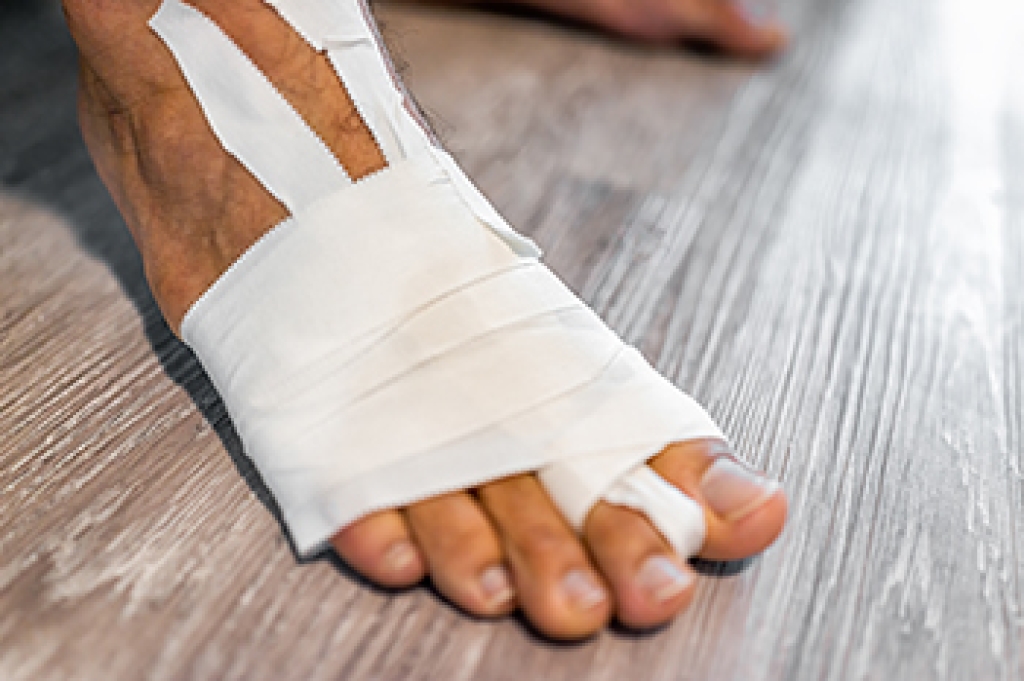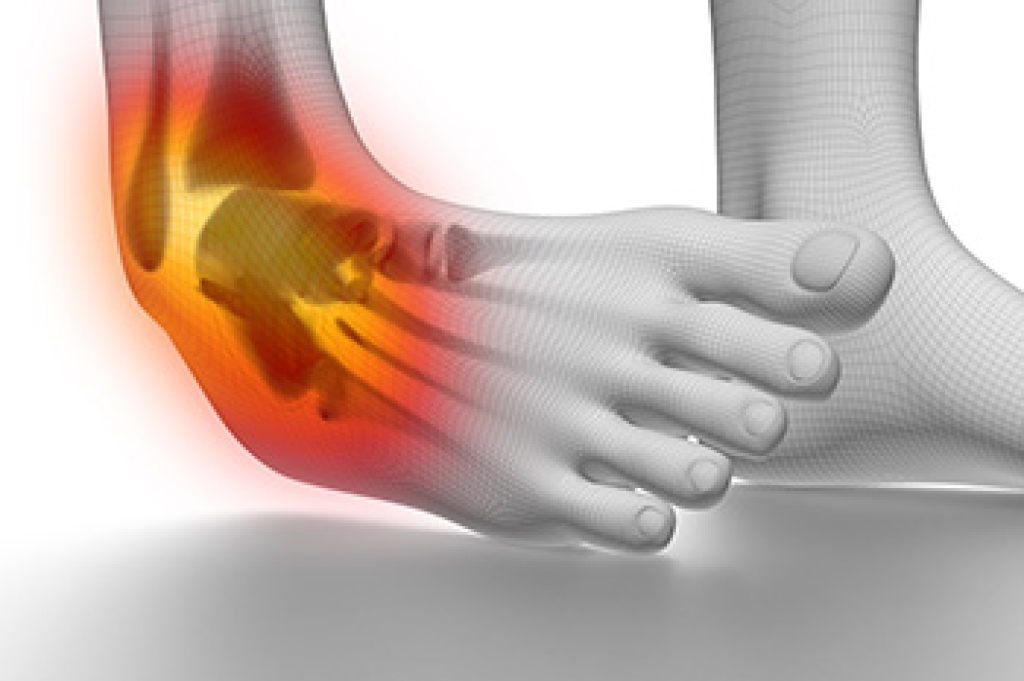Blog
Preventing Ankle Sprains in Football

Ankle sprains are common in football due to sudden changes in direction, tackles, uneven surfaces, and high-impact movements. Symptoms include pain, swelling, bruising, and difficulty walking or bearing weight. Sprains are classified by severity. First degree involves mild ligament stretching with minimal swelling and usually recovers within one to two weeks. Second degree includes partial ligament tears, moderate swelling and bruising, and may take three to six weeks to heal. Third degree is a complete tear, causing severe pain, instability, and requiring six to twelve weeks or longer for recovery. A podiatrist can assess the injury, provide bracing or supportive devices, recommend rehabilitation exercises, and guide a safe return to play. If you have sustained an ankle injury, it is suggested that you consult a podiatrist who can provide an accurate diagnosis and offer effective treatment solutions.
Sports related foot and ankle injuries require proper treatment before players can go back to their regular routines. For more information, contact Richard DiBacco, DPM of Podiatry Associates of Erie, Inc.. Our doctor can provide the care you need to keep you pain-free and on your feet.
Sports Related Foot and Ankle Injuries
Foot and ankle injuries are a common occurrence when it comes to athletes of any sport. While many athletes dismiss the initial aches and pains, the truth is that ignoring potential foot and ankle injuries can lead to serious problems. As athletes continue to place pressure and strain the area further, a mild injury can turn into something as serious as a rupture and may lead to a permanent disability. There are many factors that contribute to sports related foot and ankle injuries, which include failure to warm up properly, not providing support or wearing bad footwear. Common injuries and conditions athletes face, including:
- Plantar Fasciitis
- Achilles Tendinitis
- Achilles Tendon Rupture
- Ankle Sprains
Sports related injuries are commonly treated using the RICE method. This includes rest, applying ice to the injured area, compression and elevating the ankle. More serious sprains and injuries may require surgery, which could include arthroscopic and reconstructive surgery. Rehabilitation and therapy may also be required in order to get any recovering athlete to become fully functional again. Any unusual aches and pains an athlete sustains must be evaluated by a licensed, reputable medical professional.
If you have any questions please contact one of our offices located in Erie and Meadville, PA, . We offer the newest diagnostic and treatment technologies for all your foot and ankle needs.
Causes of a Sprained Toe

A sprained toe, also known as turf toe, happens when the ligaments surrounding the big toe joint are overstretched or torn. This injury often results from forceful upward bending of the toe during sports or sudden movements. Symptoms include swelling, bruising, limited mobility, and a feeling of imbalance while walking. Risk factors include arthritis, gout, previous toe sprains, and high impact sports. A podiatrist can assess the injury, provide imaging, if needed, recommend supportive footwear or custom orthotics, and design a recovery plan to restore strength and flexibility. Early care prevents chronic pain and stiffness. If you have symptoms of a sprained toe, it is suggested that you consult a podiatrist for expert advice and appropriate treatment solutions.
Toe pain can disrupt your daily activities. If you have any concerns, contact Richard DiBacco, DPM of Podiatry Associates of Erie, Inc.. Our doctor can provide the care you need to keep you pain-free and on your feet.
What Causes Toe Pain?
Most severe toe pain is caused due to a sports injury, trauma from dropping something heavy on the toe, or bumping into something rigid. Other problems can develop over time for various reasons.
Toe pain can be caused by one or more ailments. The most common include:
- Trauma
- Sports injury
- Wearing shoes that are too tight
- Arthritis
- Gout
- Corns and calluses
- Hammertoe
- Bunions
- Blisters
- Ingrown toenails
- Sprains
- Fractures (broken bones)
- Dislocations
When to See a Podiatrist
- Severe pain
- Persistent pain that lasts more than a week
- Signs of infection
- Continued swelling
- Pain that prevents walking
Diagnosis
In many cases the cause of toe pain is obvious, but in others, a podiatrist may want to use more advanced methods to determine the problem. These can range from simple visual inspections and sensation tests to X-rays and MRI scans. Prior medical history, family medical history, and any recent physical traumatic events will all be taken into consideration for a proper diagnosis.
Treatment
Treatments for toe pain and injuries vary and may include shoe inserts, padding, taping, medicines, injections, and in some cases, surgery. If you believe that you have broken a toe, please see a podiatrist as soon as possible.
If you have any questions please contact one of our offices located in Erie and Meadville, PA, . We offer the newest diagnostic and treatment technologies for all your foot and ankle needs.
Grades of Ankle Sprains

An ankle sprain occurs when the ligaments that support the ankle are stretched or torn, usually due to twisting or rolling the foot. Ankle sprains are grouped into grades, depending on the severity. Grade 1 symptoms include mild pain, and generally no bruising. A grade 2 sprain consists of moderate pain and joint instability. Additionally, loss of function and range of motion can accompany a grade 3 sprain. Temporary relief can be found by resting the ankle, applying compression with an elastic bandage, and elevating it to reduce swelling. A podiatrist can evaluate the injury, recommend targeted exercises, and provide support to prevent future sprains. If you have sprained an ankle, it is suggested that you promptly consult a podiatrist who can determine the severity and provide effective treatment solutions.
Ankle sprains are common but need immediate attention. If you need your feet checked, contact Richard DiBacco, DPM from Podiatry Associates of Erie, Inc.. Our doctor can provide the care you need to keep you pain-free and on your feet.
How Does an Ankle Sprain Occur?
Ankle sprains take place when the ligaments in your ankle are torn or stretched beyond their limits. There are multiple ways that the ankle can become injured, including twisting or rolling over onto your ankle, putting undue stress on it, or causing trauma to the ankle itself.
What Are the Symptoms?
- Mild to moderate bruising
- Limited mobility
- Swelling
- Discoloration of the skin (depending on severity)
Preventing a Sprain
- Wearing appropriate shoes for the occasion
- Stretching before exercises and sports
- Knowing your limits
Treatment of a Sprain
Treatment of a sprain depends on the severity. Many times, people are told to rest and remain off their feet completely, while others are given an air cast. If the sprain is very severe, surgery may be required.
If you have suffered an ankle sprain previously, you may want to consider additional support such as a brace and regular exercises to strengthen the ankle.
If you have any questions please feel free to contact one of our offices located in Erie and Meadville, PA, . We offer the newest diagnostic tools and technology to treat your foot and ankle needs.
Why Proper Footwear Matters for Healthcare Workers

Proper footwear is essential for healthcare workers who spend long shifts on their feet. The right shoes help prevent foot pain and fatigue by offering cushioning that absorbs impact and arch support that maintains stability throughout the day. Slip-resistant soles add an important layer of safety in fast-paced clinical environments where floors may be wet or slick. Wearing supportive shoes also helps protect the feet, ankles, knees, and back from strain caused by constant standing and walking. A podiatrist can assess foot structure, recommend appropriate footwear, and address any discomfort before it becomes a larger problem. If you work in the medical profession and are experiencing foot or ankle pain, it is suggested that you schedule an appointment with a podiatrist who can offer effective relief and treatment solutions.
While working on the feet, it is important to take the proper care of them. For more information about working on your feet, contact Richard DiBacco, DPM from Podiatry Associates of Erie, Inc.. Our doctor will treat your foot and ankle needs.
Working on Your Feet
Standing on your feet for long periods of time can cause stress and pain in your feet. Your whole body may experience change in terms of posture, back pain, bunions, callouses and or plantar warts. There are ways to avoid these conditions with proper foot care, smart choices and correct posture.
Positive Changes
Negative heeled shoe – Choosing this shoe type places the heel slightly lower than the ball of the foot. These are great for overall foot health. Find shoes that fit you correctly.
Go barefoot – Our feet were not designed to be enclosed for all hours of the day. Try to periodically expose your feet to air.
Eliminate Pain
Foot Exercises – Performing simple exercises, incorporating yoga and doing stretches are beneficial. This will allow increased blood flow to the area and muscles of the foot.
Achilles tendon – Stretching the foot out flat on the floor will relax the calf muscles and tendon. These exercises can be performed almost anywhere. Make sure you add these exercises to your daily regimen.
With a little bit of this information and knowing more about foot health, you will notice changes. Foot stretches and proper footwear will help with pain and prevent further issues.
If you have any questions please contact one of our offices located in Erie and Meadville, PA, . We offer the newest diagnostic and treatment technologies for all your foot and ankle needs.




